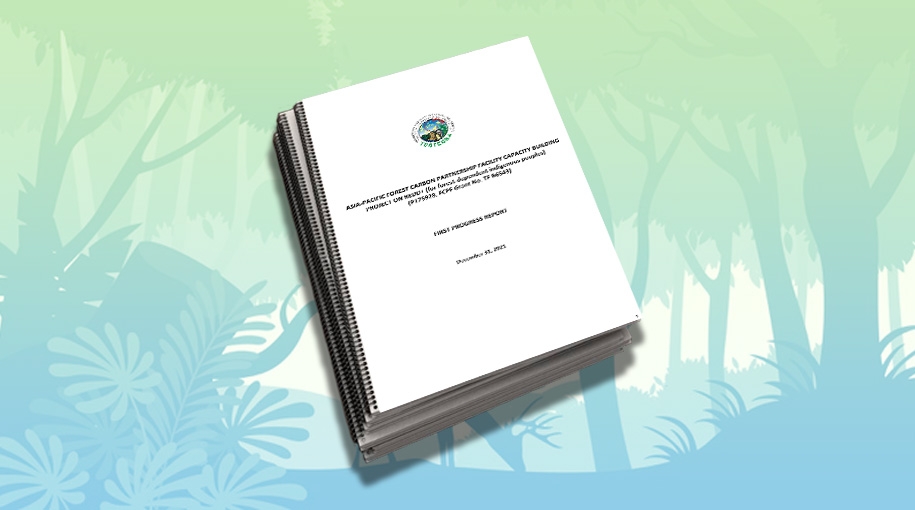ASIA-PACIFIC FOREST CARBON PARTNERSHIP FACILITY CAPACITY BUILDING PROJECT ON REDD+ (for forest-dependent indigenous peoples)
(P175928, FCPF Grant No. TF B6543)
FIRST PROGRESS REPORT
December 31, 2021
BACKGROUND
The Forest Carbon Partnership Facility (FCPF) was launched in 2007. It is a global partnership of governments, donors, private sector, civil society, and indigenous peoples (IPs) focused on
reducing emissions from deforestation and forest degradation, forest carbon stock conservation, sustainable management of forests and enhancement of forest carbon stocks in developing
countries (REDD+). It is managed by the World Bank (WB) with the following objectives: a) assist countries in their REDD+ efforts by providing them with financial and technical assistance in building their capacity to benefit from possible future systems of positive incentives for REDD+; b) pilot a performance-based payment system for REDD+ activities, with a view to ensuring equitable benefit sharing and promoting future large-scale positive incentives for REDD+; c) test ways to sustain or enhance livelihoods of local communities and to conserve biodiversity; and d)
disseminate lessons learned. The FCPF has two separate but complementary funding mechanisms: the Readiness Fund and the Carbon Fund.
Among the social and environmental safeguards that were agreed under REDD+ is the right of IPs to participate fully and meaningfully in REDD+ related processes and to ensure that the collective rights of IPs as they relate to their lands and territories are safeguarded during REDD+ design and implementation. To facilitate this, IPs requested the FCPF for an allocation for capacity building activities specifically for IPs. This request was discussed in regional and global dialogues between the IPs and FCPF. This was then approved by the FCPF Participants Committee (PC) as the Capacity Building Program (CBP) of the Readiness Fund on REDD+ for forest-dependent IPs, Southern Civil Society Organizations (CSOs) and other forest dwellers. The objective of the CBP is
to provide beneficiaries with information, knowledge, and awareness on REDD+ to enhance their understanding on REDD+, and to enable them to engage more meaningfully in the design and
implementation of REDD+ readiness activities and emission reduction programs. The aim is to support activities that empower and enable these stakeholder groups, to enhance and influence
REDD+ development outcomes, and also to strengthen mechanisms for inclusion, accountability, and participation.
The CBP has two components, one for IPs and another for Southern CSOs and local communities – each implemented in sub-Saharan Africa, Latin America and the Caribbean, and Asia and the
Pacific through projects. Phase 1 was implemented from 2008-2015 supporting awareness-raising workshops, publication of training manuals and capacity building activities. Funding
proposals were processed through the WB’s general procurement system where Indigenous Peoples’ Organizations (IPOs) and CSOs were selected and contracted as consultants to carry out
specific capacity building activities. Phase 2 was implemented in accordance to the WB’s Procedure for Small Recipient-Executed Trust Fund (SRETF) grants with six regional grants
provided to recipient organizations. For IPs in the East Asia-Pacific and South Asia regions, Tebtebba Foundation (Indigenous Peoples’ International Centre for Policy Research and
Education), a non-government organization with consultative status to the UN-ECOSOC based in the Philippines, was chosen to be the Recipient and implementer of the project. National-level
activities (Component 1 of the project) were financed through sub-grants and consultancy. Tebtebba will continue as the Recipient and implementer in the region for Phase 3 and national level
activities (Component 1) will be supported through sub-grants. This is the first progress report prepared for the project, covering the period June 1, 2021 to December 31, 2021.


